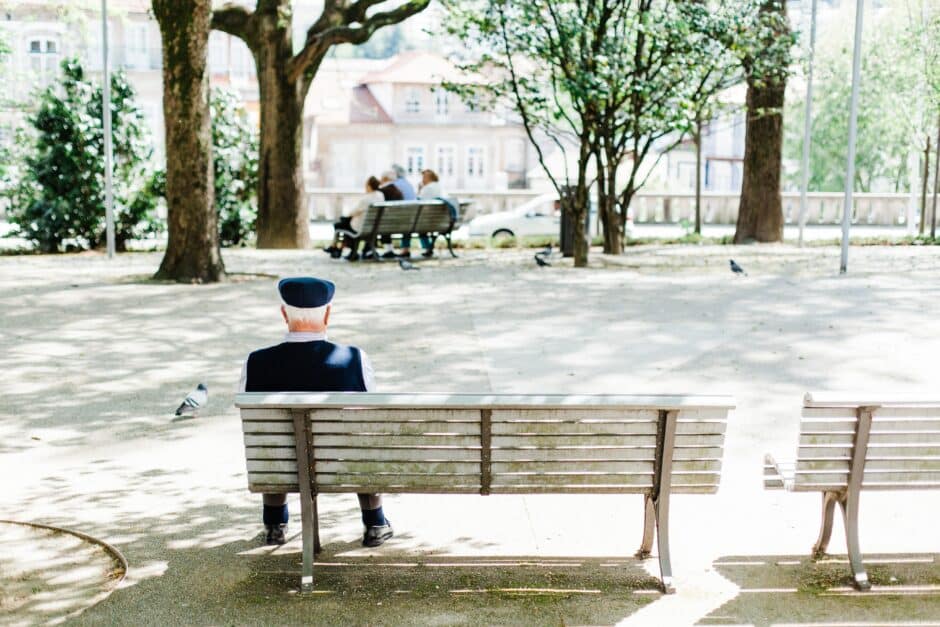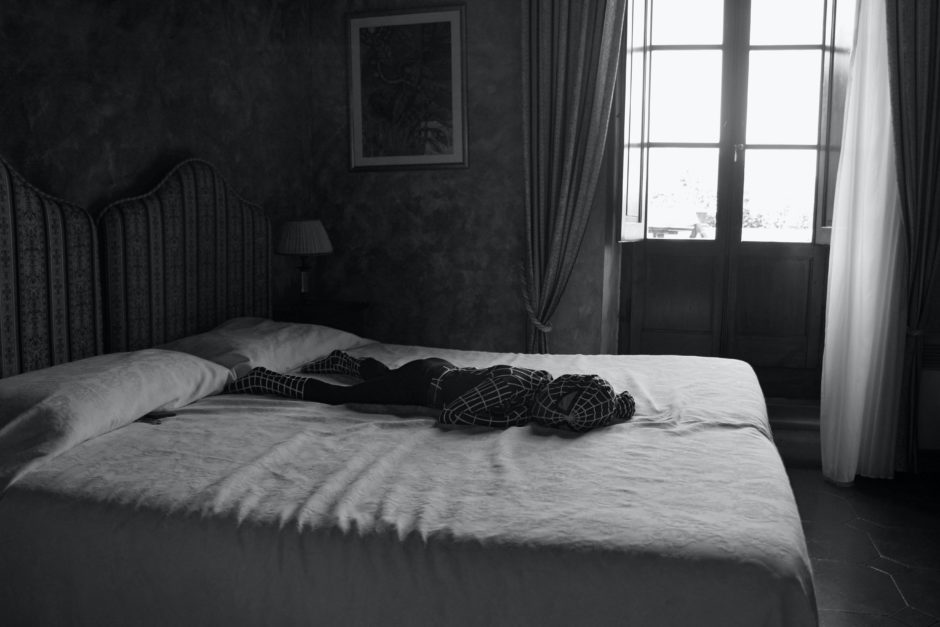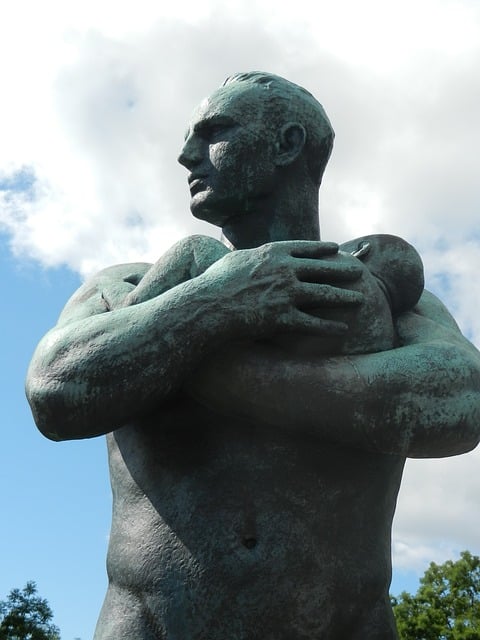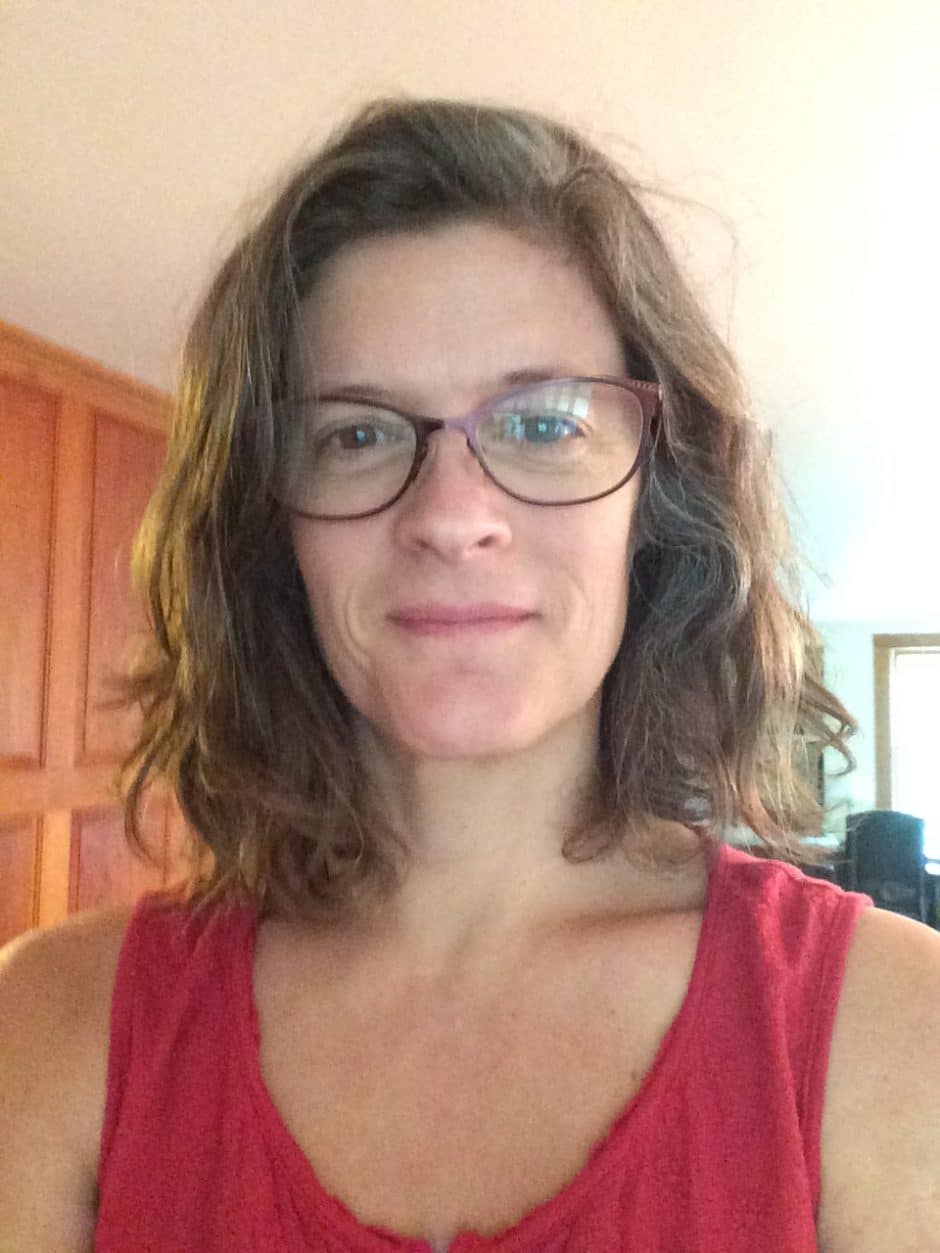The lanky ten-year-old runs full tilt toward Moira’s car as she turns sharply into her sister Bridget’s driveway, barely missing Conor’s BMW. Her son is beside the door before she can open it. “I got a triple, and a double too.” He’s breathless, a huge brown growth of a catcher’s mitt at the end of his skinny arm.
“That’s terrific, Michael.” She slides out of the car, hoping he won’t require too large a dose of admiration, because she’s late. Even her sister Kate, who prides herself on defying start times, is here already, her minivan parked across the street, next to Liam’s pick-up truck. Moira dreads going inside. She and her sisters and brothers are meeting here today to talk about their father, who’s about to be kicked out of his brother’s house in Boston.
She bends to kiss her son, smells the sweet sweat of his play. Perspiration darkens his auburn hair, and his jeans bear the fresh tracks of a slide. He’s big for his age, like Sean, her older boy, and it’s clear they’ll both be as tall as all the Donnegans. She prays that’s where the resemblance will end.
Michael shouts the news of her arrival to Sean, who approaches the low picket fence surrounding Bridget’s huge back yard, looking unimpressed. Moira’s brother Liam, close behind him, waves a greeting and Moira nods. Sean wears a smirk. The sullenness that set in when Moira and Ken broke up has hardened. He’s chosen sides. “I let him hit it,” Sean says, but he brings himself to full height, can’t fully conceal how important it is to show his mother that Michael is no threat.
“Now, don’t be like that,” says Liam, and Sean’s face flushes, reminding Moira how readily he responds when a man points something out. Even Bridget, who’s been watching the boys after school since Ken moved out, has trouble getting him to listen.
“You did not,” Michael insists, and steps up to his brother, who’s leaning over the fence, and tries to grab his baseball cap, but Sean swats him away.
From the yard, Bridget’s daughter Cathy calls them back to the game. “I’ll see you guys later,” Liam tells them, and Moira follows him into Bridget’s kitchen. He’s thin as ever, wearing the leather jacket he dons for occasions when he wants to be especially belligerent. Once inside, he heads for the living room without stopping to chat.
Bridget has water on for tea and she takes her time getting it ready. She seems to be in no hurry for what comes next. She’s wearing another long, loose skirt, but Moira notices she’s replaced her usual T-shirt with a pale blue sweater and her hair is brushed back. She pours the water with exaggerated care, adjusts the spoons on the saucers as if they must conform to code, and brings the cup to Moira, a peace offering. “They’re here. Inside,” she whispers, and motions toward the living room.
“All of them?”
“Peter doesn’t want to start without you.”
It was Peter who asked for the meeting, and Moira is still amazed that he managed to get all seven of them together and on such short notice. No doubt it was Maggie, their linchpin, who got it done. The words talk about Dad must have drawn them in like gawkers to a freak show. They haven’t exchanged more than ten words about their father in almost twenty-five years, not since their mother left him—a decision even Fr. Cashman, who’d baptized all of them and had known their father since he arrived from Derry, couldn’t find fault with.
Moira has seen her father only a handful of times in the past ten years—family occasions she couldn’t dodge. The last time, two years ago, she was attending her cousin’s wedding, in Boston, and her father was seated at the next table. They’d barely exchanged a greeting, but later in the evening he turned to her. The tables in the hall were close and her chair backed up to his. “If you can navigate us to the dance floor, I’d love to have this waltz.”
“It’s not a waltz,” she said, because she had no intention of getting up. What she wanted to say was How dare you? How dare you think we can dance together? But they did. She let him hold her and she put her arm across his shoulder. When he remarked at how tall she was, she had trouble catching her breath. When he asked if her hair was still red, she lost her footing, so she pretended it was because she rarely wore heels.
Later, out in the parking lot, she gave Aunt Mary her number. “In case he ever wants to reach me,” she said. But he never did.
Moira follows Bridget into the living room, where the others have settled in. Someone coughs, and Maggie, a heavy woman with vigilant eyes and the all-knowing look of a matriarch, says Moira’s name, but otherwise the room is stiff with silence. Moira feels as if she’s been called back to reprise a role in a play that closed years ago. The room smells of ugly memories and sweaty tension, like the waiting room of some therapist who can’t leave well enough alone.
Peter, the only one on his feet, leans against the covered keys of the piano Bridget never plays, cigarette in hand, his expensive tie undone. He reminds Moira of a crooner trying to warm up the crowd with one-liners that are falling flat. He’s the unspoken head of this disjointed band of siblings, a title he stepped into at first simply because he’s the oldest male but later his accomplishments gave him status. A decorated veteran of the Viet Nam War, a successful business owner, and the father of five boys, he acts as if he survived unscathed. Moira isn’t the only one who doesn’t buy that. The best you can hope for after a childhood like theirs is to get properly diagnosed.
Moira and Bridget place their tea on the coffee table and join Maggie and Liam on the couch, not far from the piano. Pressed shoulder to shoulder, they dutifully wait to hear what Peter has to say. He clears his throat to begin but doesn’t. The others seem to be taking care not to look at each other as he gives another false start. Then silence.
“For fuck’s sake,” Liam says, “what’s going on? Does the old bastard have cancer or something?” Moira sighs. Even sober, Liam can belittle any occasion. He is Peter’s Irish twin, born less than twelve months after him. Unhappy with second billing, he’s played the foil ever since, the one beyond redemption.
“Why don’t you just say what you have to say, Peter?” Maggie coaxes, focusing, as usual, on the here and now. Her stability has been one of the family’s few anchors. She refuses to dramatize, forces them to accept their options, such as they are. She’s approaching fifty now and has put on weight, but it suits her image: the truth-teller, the one who won’t pretend you can lament your way out of trouble.
“All right, then,” Peter begins. “Like I told Maggie, Dad needs a place to live.” He joins his hands in front of him, like an airline ticket agent looking for someone willing to give up his seat. “So I’m going to need some help with this.” He stops, reaches into his jacket for his cigarettes.
Help? Moira glances at the others. They all seem bewildered.
“What are you talking about?” Liam asks.
They don’t get an answer because Cathy slides open the door to the back yard, sparing no fingerprints on the glass. “Catheee,” Bridget whines, “I just cleaned that glass.” The girl begins wiping the spots with her baseball glove. “Catheee, you’re letting out the air-conditioning.”
The girl leaps into the room, ready to defend herself. “Sean says I can’t have four strikes,” she complains, seeking some greater justice than the rules of the game allow—anything that will get her on base.
Bridget chases her back outside and grabs the Windex she keeps at the ready. The others clearly aren’t ready to consider Peter’s request, because they begin chatting about their houses and their kids, swapping stories about home improvement projects and the cost of dance recital costumes. Moira watches the urgency with which Bridget attacks the glass, and remembers something she thought was gone. The spots were on the wall, and Bridget had gotten up early to try to wash them away. She didn’t want their mother to see them again and get upset. Most of the spots were tiny; from across the room you wouldn’t even know it was blood, because they were brown by then. They reminded Moira of dark freckles and how her father would make constellations from the ones on her arms, point out a baseball diamond, a wagon, a bear’s face. On the wall, she thought she could make out an angel’s wings, but she couldn’t be sure because Bridget was working too fast, and anyway, she knew already that angels had to be make-believe. People liked to pretend there were guardians, but nothing could really protect them.
Bridget puts away her Windex and returns to the couch, adjusting the pillow before taking her seat.
“So what are you saying, Peter?” says Maggie.
“I’m talking about Dad.”
“That much we got,” Liam says.
“Have you actually talked to him? Is that what you’re saying?” Kate prompts. She’s soft spoken, almost whimpering now, and Moira wishes she would stop acting as if she owes the world an apology for breathing. Still, she’s grateful for the question, eager for Peter to get this over with.
Peter flicks an ash into a nearby philodendron, and Moira hears Bridget exhale in annoyance. “Dad’s been in touch with me for more than a year,” he says. “I’ve been up to see him at Uncle Pearce’s.”
“Uncle Pearce is dead two months now,” says Moira, looking at the others, confused. Only Maggie returns her look.
“I guess we should have sent a Mass card,” says Liam, and Conor laughs, always ready to help keep the temperature from rising. He’s wearing a dark gray, conservative suit that makes him look incapable of deceit, his tie perfectly knotted. She can’t remember the last time she saw him in anything not designed to impress a jury.
“So how is he?” says Kate.
“Who gives a shit how he is?” says Maggie.
“Christ,” Liam mutters. “I never should have come here sober.” He lights a cigarette, and Moira clenches her teeth.
“He’s good. Yeah, he’s fine. I took John and Doug up with me last time. They got a kick out of him. And they’d never been to Boston, so it was good. But like I said, it looks like he’s going to have to move out.”
Moira has no trouble picturing that scene—her father joking and teasing, her nephews taken by his odd ways. Pete Donnegan is a larger-than-life transplant whose quirks and speech patterns are throwbacks now, mimicked and sentimentalized in movies. Still, this news bothers her, though she can’t understand why. She feels robbed, as if Peter has claimed for himself something that belongs to her too. She wants to tell him that, ask why he didn’t invite her to go, but she knows how absurd it would sound. Maybe keeping him at a distance was fine as long as he wasn’t close to any of the others.
Peter’s tone softens. “He’s getting old,” he says. “I think he’s a little scared.”
“Scared?” Kate says.
“He’s all alone; he’s got no one.”
“And whose fault is that?” Maggie says.
“I’m not defending him,” Peter insists, putting up his hands, as if to ward off an attack. “This isn’t anything like that. There’s just no one to look after him up there.”
“Like there was no one to look after us when Mom took that job as a receptionist,” Bridget says.
“The rest of us had to do his job for him,” says Maggie.
Liam checks his watch. “Are we gonna go through his venial sins too? I’ve only got four hours,” he says, and Conor lets out a sigh, bracing for the inevitable ruckus to come.
“I’m not here to talk about any of that.” Peter directs this to Maggie, stabbing a finger into his palm to mark the subject off limits. He clearly doesn’t want this to get out of control, which everyone knows is the only place it can go if she lets loose. “I’m just saying that one of us needs to take him in.”
Liam spits something out, a cross between a snort and a chuckle, but no one says anything.
“He’s an old man,” Peter prompts, clearly expecting a volunteer. “And he’s gone completely blind. He’s got barely any sight left at all now.” He’s practically pleading, hardly his usual ploy. He clears his throat as if to signal what’s coming. “He’s got to find a place by next week.”
Liam whistles softly, and Maggie shakes her head, eyes wide in amazement. “Are you serious?”
“Is he still drinking?” says Kate.
“Talk about stupid questions,” says Liam.
“What’s so stupid about it?” Conor says. “How do you know he’s still drinking?”
“Because Aunt Mary called me a year ago, wanting to know if I could come get him out of there.”
“I know all about that,” says Peter, raising both hands, palms out. He reminds Moira of the Pope, calming the crowd from his Vatican balcony. “Aunt Mary told me everything. But that’s not what this is about. She’d let him stay, but she needs to sell the house. She may have an offer.”
“Yeah, right,” says Liam. “That’ll all happen by next week.”
“Shut the fuck up,” Peter tells him.
“You really expect one of us to do this?” says Bridget, providing her own answer with a dismissive wave.
“I’m not going to see him in the street,” says Peter. “He’s my father.”
“So you’re volunteering to take him?” Conor says. Moira hears this as a challenge, inviting Peter to put up or shut up. She wonders if Conor senses it too, that Peter has claimed a kind of sole ownership of their father, the right to decide for him.
“I can’t,” Peter says. “Helen won’t do it.”
Maggie laughs hard. “But you expect us to?”
“For heaven’s sake, he’s old. He’s nothing like he used to be.”
“Oh, please,” she says, “spare us the violins.”
“Right,” says Liam, “we need bagpipes for this one.”
“Like you ever gave a rat’s ass about anybody,” Peter snaps.
“Ah, his lordship has spoken,” says Liam.
Moira squirms. It’s hard for her to be with them when they argue like this. Closing her eyes, she lets their voices merge, tries to disengage. She can’t help imagining how lost her father must feel to have nowhere to go. She remembers what that felt like, wedged on someone’s lap in a crowded car. How did they fit so many people into it? Bridget was crying. Conor was on Aunt Nora’s lap, wearing only one shoe. He’d thrown up, and the satin lapels of his tuxedo were stained. Peter and Helen’s wedding had ended in chaos, their father ringed by men to hold him back. Somebody had to stop him. That’s what everyone in the car was saying. They couldn’t let him go on like that. He would have hurt someone. Moira’s mother was already hurt by then, but that didn’t seem to count.
Aunt Nora was scolding her mother, insisting she couldn’t go home to him, not that night, not ever. They’d have to stay at Aunt Nora’s, and Moira’s stomach ached from it, remembering the last time they wound up there. She didn’t want to sleep in a strange place, didn’t want to be without her books and her dolls. And what would her father do when he realized they hadn’t come home? He’d come after them like the last time, wouldn’t he? He could hurt them.
She prayed her mother would tell them to turn the car around, head back to their apartment. But she didn’t. A panicky tingling down the back of her legs made Moira desperate to get out of the car, to run, find her way home. Her dad wasn’t always drunk, not really. Sometimes he told them stories. Just that morning he’d talked about being best man at his brother’s wedding, tying tin cans onto the back of his car. And sometimes he sang. He’d show them what to do with the song to make their voices blend, harmonizing he called it. Maybe if they talked to him, made him understand, he wouldn’t hurt anybody anymore. She looked at her mother, who’d turned away from the window. The other eye was visible now, badly swollen, making the lid close, and Moira saw why they had no choice.
By the time they returned to the apartment a week later, their father had stocked the fridge with ice cream and soda and found them a skinny terrier from somewhere, with one bad leg. Moira knew he was sorry. He didn’t have to say so.
Kate is listing the reasons she can’t ask Charlie to let him stay, as if this needs explaining. Charlie—her new husband, the fourth—is a wormy little tyrant she met on a discount cruise ship, who’s never done talking about gun rights and keeping America safe from immigrants. He’s never even met their father.
“Is he collecting Social Security? Does he have Medicare?” Kate asks, as if these are the issues that might be holding the others back.
“He’s got all that,” Peter says, “and I’ll take care of the rest.”
Moira’s not surprised at this, given Peter’s income, and doubts anyone else is.
“I could talk to Terry,” Conor says, but Maggie snaps at him.
“You will not talk to Terry. The last thing you need is a viper like that in your home.”
“If you’re ready to put money out, why don’t you just set up an apartment for him?” says Liam.
“He can’t see, for fuck’s sake,” Peter says.
“Then get him a live-in.”
“You can’t trust those people,” says Kate.
“I’m going to spend time with him,” says Peter. “He wants to go to ballgames, visit my office.”
Moira lets herself picture her father wearing a Yankees cap, sitting with her at one of Sean’s games as she describes his wind-up, the speed of the pitch. Her throat tightens. It’s too hard to think about, the years of wondering what it would feel like to have a father, a grandfather for the boys. Ken’s dad has never been much good at it. He spends half his time in meetings and the other half on planes. “I’ll just be a minute,” she tells the others, getting up from the couch. Liam whistles what sounds like “Eve of Destruction” as she leaves the room.
Bridget’s bathroom is immaculate, no hairs in the sink, no spots of toothpaste spit on the mirror, none of the little touches that would help Moira feel at home. She leans forward, both hands braced on the pink porcelain, staring into the mirror at her chin, afraid to look into her own eyes. She inspects the tiny mole below the corner of her mouth; her father’s is in the same exact spot. She wonders why Peter’s so convinced he wants to be back in their lives.
When her father still lived in their old neighborhood, in his sister Deirdre’s basement, Moira walked thirty blocks to see him, telling herself the whole way that it was the stationery store she really wanted to go to, the one that sold the carbon paper she liked. But when she reached the store, she crossed the street and rang the doorbell, her fists deep in her pockets, fighting the urge to turn around. She was graduating high school that Friday and she wasn’t sure he knew. She doubted her mother would have told him and the idea that he might want to be there plagued her, made her feel wrong not to tell him.
Her aunt didn’t recognize her at first. She put her hands to her mouth as if to keep herself quiet. Their embrace was awkward and over quickly, as if the woman found no purpose in it. “He’s downstairs,” she said. “I’ll tell him you’re here.”
“No, it’s okay. I’ll go down.”
The staircase descended into a narrow space that smelled of cigarette smoke and mildew. He’d just gotten a new seeing-eye dog, a shepherd, and almost immediately it began to bark. “Quiet down, McCool,” her father scolded, but the dog, determined to do his job, settled into a soft growl. “Who’s there?”
“It’s me. Moira.” She reached the foot of the stairs and he rose from the couch. The room was lit only by the light from the small, high window that carved a view of shoes stepping by.
“Moira. How are ya?” He began to say more but stopped and she wondered if he was upset, because he was rubbing his eyes and color had risen in his neck.
“I’m sorry,” she said. “I just—”
“Sorry? Don’t be silly.” His voice sounded as if someone were squeezing him. He rubbed his hands on the sides of his pants, at a loss, maybe, for what to do. He didn’t ask her to sit down. He just stood there. So she told him what she’d come to tell him, that her graduation would be at the school, in the auditorium.
He sat down, called the dog closer, lit a cigarette. She waited in the silence, saw the look the dog gave her, as if still not convinced she was allowed here. Finally, she said good-bye and her father said he’d be there. He wasn’t.
Moira runs cold water from the tap, wets her face a bit, steps out into the living room. They’re on their feet. She can see they’ve been waiting for her, want to tell her something.
“Listen,” Peter says, his voice low, almost melancholy, “we’re going to talk to Aunt Mary, see if we can figure out a way for him to stay there a bit longer.”
Moira tucks her hair behind her ears, senses the uncertainty in the room. They have no answers, and the sadness of it empties her like hunger. It’s not the way things should be. “No, don’t do that,” she says, as if she’s made up her mind, as if she’s certain. “He can come with me.”
Someone gasps, and there’s mumbling, sounds of disbelief.
“Moira, what are you saying?” says Maggie. Her grip on her pocketbook tightens and she looks ready to whack someone with it.
“Will you please leave her be?” says Peter.
Moira walks over to the glass doors to see the kids outside but no one joins her. Bridget and Maggie are whispering and Peter goes into the kitchen. She wonders if they’re afraid to break the spell, afraid she’ll change her mind. The kids must be playing hide-and-seek, because she sees Michael sneak into the shed and close the door, which surprises her because he’s afraid of the dark. So was she, for a long time. On summer nights her father sometimes sat alone in the living room without a light on. She would slip into the darkness with him, settle in a far corner of the room, watch the smoke from his Camels lift in the warm air. His straight-backed chair would be pulled up close to the window, as if he was expecting to see something. Always he sat the same way, one leg crossed over the other, one arm resting limply across his lap. The streetlight deepened the lines of his face, and every so often, ever so slowly, he brought the cigarette to his lips and sucked the smoke deep into himself. She never approached him, certain he wouldn’t want that. Instead she kept watch with him, listened to his calloused hand scratch against his whiskers. When he went to bed finally, she’d pretend he’d kissed her good night.
Someone puts a hand on her shoulder. It’s Conor, the reasonable one, the one who believes he can stay out of harm’s way. He’s told Moira he won’t have children, won’t let the cycle continue. “You don’t have to do this,” he says.
But she does.
Mary Ann McGuigan’s fiction has appeared in The Sun, Image, North American Review, Prime Number, and other journals. Her collection Pieces includes stories named for the Pushcart Prize and Sundress Publications’ Best of the Net. Mary Ann’s young-adult novels, about teens trying to make sense of the chaos grown-ups leave in their wake, are ranked among the best books for teens by the Junior Library Guild and the New York Public Library. Her novel Where You Belong was a finalist for the National Book Award. For more about her fiction, visit www.maryannmcguigan.com, you can also follow her on Instagram.
***
Writing Cohort Opportunity
Circe is offering: Crucible – A Year-Long Writing Cohort
Let by Gina Frangello and Emily Black, this cohort is designed for writers seeking to spend a year deeply immersed in writing or revising a book length work.
Email info@circeconsulting.net for more information
***














